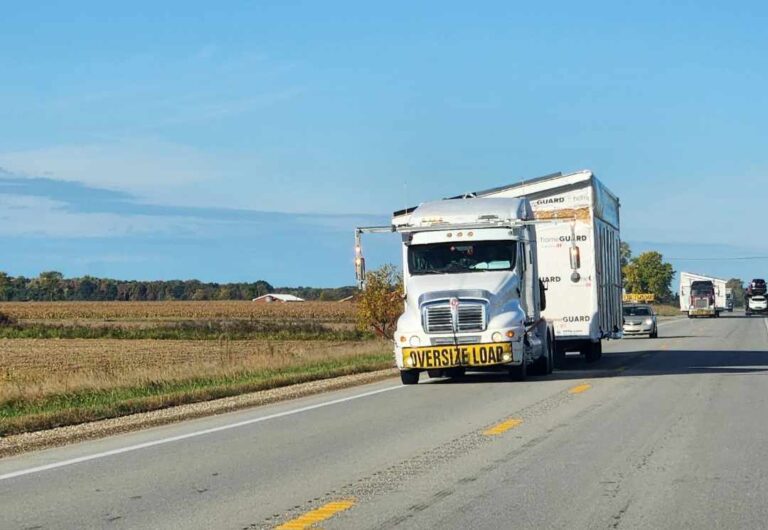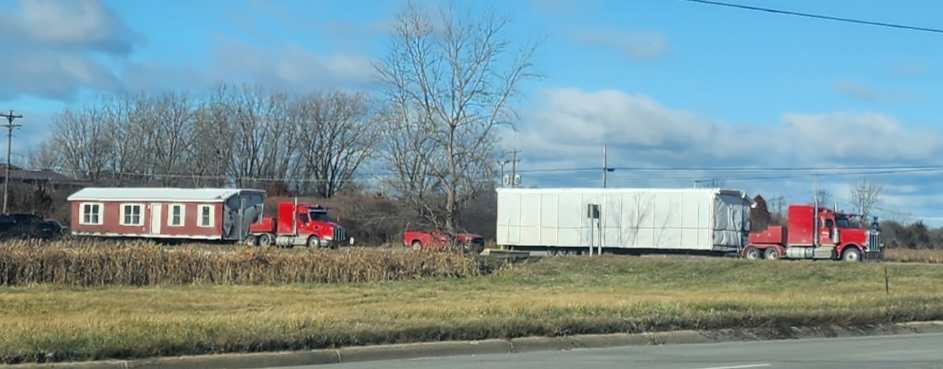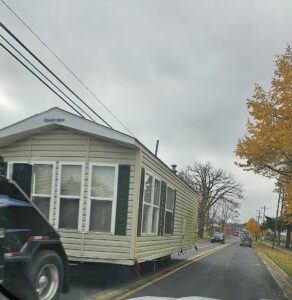Moving a trailer house can be a daunting task, requiring careful planning and preparation. Whether you’re adding an addition, relocating to a new site, or simply looking for a change of scenery, hiring an experienced trailer house mover is crucial for a successful move. In this article: Affordable Mobile Home Movers: Get a Quote Today we will discuss all you need to know about moving a mobile home plus some bonus questions and answers.
From checking specifications and ensuring proper installation to understanding site details and dimensions, there are numerous aspects to address before embarking on your journey. We’ll delve into these critical considerations and offer practical tips to help you navigate through the process smoothly. So buckle up and get ready as we take you through the ins and outs of hiring a trailer house mover.
“Success is not final, failure is not fatal: It is the courage to continue that counts.” – Winston Churchill
Understanding the Cost of Moving a Mobile Home
Factors Affecting the Cost
Moving a mobile home involves several factors that can impact the overall cost. Let’s explore some key considerations:
Size and Type of Mobile Home
Mobile homes come in different sizes and types, such as single-wide or double-wide trailers. The size and type of the mobile home play a significant role in determining the complexity and cost of moving. Single-wide trailers are generally smaller and lighter, making them easier to transport compared to larger double-wide trailers. It is important to consider these factors when planning for relocation.

Distance and Destination Considerations
When moving a trailer house over long distances, there are additional factors to take into account. Planning for permits, route restrictions, and logistics becomes crucial to ensure a smooth move. Different states may have specific requirements for transporting mobile homes across their borders. Choosing the right transportation method based on distance and destination is essential for an efficient move.
Age and Condition Impact
The age and condition of a mobile home can also affect the moving process. Before relocating, it is important to assess the structural integrity of the trailer house. Older or damaged trailers may require special considerations during transportation to ensure their safety and prevent further damage.
Cost Estimates and Breakdowns
To understand the cost implications better, let’s delve into two specific aspects:
Single-Wide vs. Double-Wide Trailers
Single-wide trailers are generally smaller in size compared to double-wide trailers. This difference in size affects not only the weight but also the transportability of these homes. Moving a single-wide trailer tends to be less complex than moving a double-wide trailer due to its smaller dimensions.
Nationwide Moving Services Comparison
There are various nationwide trailer house movers available with different services offered, pricing structures, and customer reviews. It is essential to compare these options before choosing a reliable mover that fits your budget and requirements.
Permits, Inspections, and Legal Requirements
When moving a trailer house across state lines or within local jurisdictions, it is crucial to understand the permits and legal requirements involved. Complying with these regulations ensures a smooth and lawful move. Inspections are necessary to ensure that the mobile home meets safety standards before transportation.
Bonus Question: Can you move an Old Mobile Home?
Yes, it is possible to move an old mobile home using specialized transportation services equipped to handle the relocation of such structures. However, it requires careful planning, permits, and adherence to local regulations.
Preparations for Mobile Home Transport
DIY Preparation Steps
If you’re planning to move a mobile home, there are several important steps you need to take to ensure a smooth and successful transport. Let’s explore some key preparations you should consider if you decide to handle the process yourself.
Safety Checks and Precautions
Before relocating a mobile home, it’s crucial to conduct essential safety checks. Inspect the structure for any signs of damage or weakness that could pose risks during transportation. Check the tires, axles, and hitching mechanisms to ensure they are in good condition.
To prevent damage during transit or setup at the new location, take precautions such as securing loose items inside the home and protecting fragile fixtures. Consider reinforcing windows and doors, removing any protruding elements like antennas or satellite dishes, and ensuring all exterior panels are securely fastened.
While DIY moving can be an option for some homeowners, hiring professionals who prioritize safety measures during transportation is highly recommended. Professional movers have the expertise and experience to handle all aspects of mobile home transport safely.
Disconnecting Utilities and Fixtures
Properly disconnecting utilities is another crucial step in preparing a mobile home for transport. Start by shutting off water supply lines, gas connections, and electricity sources. It’s important to follow proper procedures when disconnecting these services to avoid accidents or damage.
Remove fixtures such as light fixtures, ceiling fans, appliances, and other items that may not be securely attached. Safely pack these items separately to prevent any potential damage during transit. Hiring professionals who specialize in mobile home transport can ensure that all utilities are disconnected properly without compromising safety.
Professional Preparation Services
While DIY preparation is an option for some homeowners, it’s worth considering professional preparation services provided by experienced movers specializing in mobile homes.
Loading and Securing the Home
Loading a trailer house onto a transportation vehicle requires careful techniques. Professionals use specialized equipment and techniques to ensure a smooth loading process. They have the expertise to position the home properly on the vehicle, distributing weight evenly to prevent shifting during transit.
Securing the mobile home is crucial to prevent damage while on the move. Professionals utilize various methods such as straps, braces, and tie-downs to secure the structure firmly in place. This ensures that the home remains stable throughout the journey, minimizing any potential risks.
Hiring Professional Mobile Home Movers
Identifying Reliable Movers
It is crucial to hire reliable and experienced professionals. To identify trustworthy movers, consider factors such as their reputation, track record, and customer reviews. Look for companies that specialize in mobile home transportation and have a strong history of successful moves.
Shopping for Transport Services
When comparing different trailer house transport services, there are several key factors to consider. Start by evaluating pricing options, insurance coverage, experience level, and customer reviews. It is important to obtain multiple quotes from different companies before making a final decision. This allows you to compare costs and services offered by each provider.
Nationwide Movers Overview
There are reputable nationwide movers who specialize in trailer house relocation. These companies have the expertise and experience necessary to handle the transportation of mobile homes across long distances. They offer comprehensive services that include packing, loading, transporting, unloading, and even setup at the new location.
One way to gauge the reliability of these nationwide movers is through customer testimonials. Positive experiences shared by previous clients can provide reassurance about their professionalism and quality of service. Take the time to read reviews or ask for references from the moving company before making your decision.
Benefits of Professional Assistance
Hiring professional mobile home movers brings numerous benefits that make the entire process smoother and stress-free. One significant advantage is the setup services provided by these experts at the new location. They will ensure that your mobile home is properly installed and leveled on its foundation for optimal stability.
In addition to installation and leveling, professional movers often offer additional services such as connecting utilities (electricity, water) once your mobile home has been set up in its new location. This saves you time and effort in coordinating with utility providers separately.
Another benefit of hiring professionals is their expertise in anchoring your mobile home securely to prevent shifting or damage during extreme weather conditions. They have the knowledge and equipment to ensure that your home remains safe and stable.
Weighing DIY vs. Professional Moves
Pros and Cons of DIY Moving
Moving a trailer house on your own without professional assistance has its advantages. Firstly, it can be cost-effective as you won’t have to pay for professional movers. You have complete control over the moving process and can plan according to your own timeline.
However, there are potential challenges and risks associated with DIY moves. One major challenge is the lack of expertise in handling complex logistics involved in moving a trailer house. From obtaining permits to ensuring legal requirements are met, these tasks can be overwhelming and time-consuming for someone without experience.
Another consideration is the physical labor involved in moving a trailer house. It requires specialized equipment and knowledge to safely transport such a large structure. Without proper training and equipment, there is an increased risk of accidents or damage to the property.
While DIY moves may offer cost savings, it’s important to weigh them against the potential complications involved. Inadequate planning or unforeseen issues during the move can lead to delays, additional expenses, and unnecessary stress.
Why Professional Movers Outshine DIY
Hiring professional trailer house movers offers several benefits that outweigh attempting a DIY move. Firstly, professionals have the expertise necessary to handle all aspects of the move efficiently. They understand the complexities involved in transporting a trailer house and can navigate through logistical challenges seamlessly.
Professional movers also have extensive knowledge of permits and legal requirements specific to mobile home transportation. They will ensure that all necessary paperwork is completed accurately and on time, saving you from potential legal complications.
Safety is another crucial aspect where professional movers shine. They possess specialized equipment designed for moving trailer houses safely and securely. From hydraulic jacks to sturdy trailers, they have everything needed for a smooth relocation process while minimizing any risk of damage or accidents.
Moreover, hiring professionals provides peace of mind throughout the entire moving process. You can rely on their experience and expertise to handle any unexpected situations that may arise. They have the necessary skills to troubleshoot and find solutions quickly, ensuring a stress-free move.

Saving Money on Your Mobile Home Move
Moving a mobile home can be an expensive endeavor, but with some careful planning and budgeting, you can find ways to save money.
Tips and Tricks for Budget Moves
There are several practical strategies you can employ. First and foremost, consider negotiating prices with moving companies or seeking out discounts. Many moving companies are willing to work with you to find a price that fits your budget.
Another way to save money is through efficient planning. By optimizing the time spent during the move, you can minimize costs associated with labor or equipment rental. Plan ahead and make sure everything is packed and ready to go before the movers arrive. This will help streamline the process and reduce any unnecessary delays.
Consider doing some of the work yourself if possible. While it may require more effort on your part, handling tasks such as packing or disassembling furniture can significantly cut down on expenses. Just be sure to prioritize safety and take precautions when handling heavy items or working in potentially hazardous conditions.
Understanding Weight Considerations
Weight restrictions play a crucial role. It’s essential to understand their significance and implications throughout the entire moving process. One key aspect affected by weight is transportation methods. The weight of your mobile home will determine what type of vehicle or equipment is needed for transportation.
Moreover, certain weight limits may require you to obtain permits before moving your mobile home. These permits ensure compliance with local regulations regarding oversized loads or specific routes that need special attention due to weight restrictions.
Understanding weight considerations also helps in route planning. Different roads have different weight limits imposed by authorities due to infrastructure limitations or safety concerns. Being aware of these restrictions allows you to plan the most suitable route for your move, avoiding any legal issues or potential damage to the mobile home.
Bonus Question: What Is The Rough Cost To Move a Singlewide or Doublewide Mobile Home
Types of Mobile Homes and Their Costs
Moving a mobile home can be an exciting yet challenging endeavor. Before embarking on this journey, it’s essential to understand the different types of mobile homes and how their costs may vary. Let’s explore the distinct moving costs associated with single-wide and double-wide trailers, comparing pricing structures and additional expenses for each type.
Distinct Moving Costs by Type
Factors such as size, weight, and distance play a significant role in determining the overall cost of moving a mobile home. These homes are typically narrower and more compact than their double-wide counterparts. As a result, they tend to be lighter and require less equipment during transportation. This often translates to lower moving costs compared to double-wide trailers.
In contrast, double-wide trailers are wider and larger in size since they consist of two separate units joined together. Due to their increased dimensions, transporting them requires specialized equipment such as wide-load permits, escort vehicles, and potentially even disassembling certain sections for safe passage through narrow roads or bridges. These additional requirements can contribute to higher moving costs when compared to single-wide trailers.
Pricing Structure for Moving Mobile Homes
The pricing structure for moving mobile homes is usually based on various factors like mileage, labor charges, permits, insurance coverage, and any necessary modifications or repairs during the move. It’s crucial to obtain quotes from reputable trailer house movers who factor in all these elements before finalizing your decision.
Beyond the basic transportation costs mentioned above, there are other potential expenses that may arise during the relocation process. These could include disconnecting utilities at the current location (such as water, electricity, gas), preparing the site at the new destination (foundation work or leveling), obtaining necessary permits from local authorities if required by law or regulations in your area.
It’s important to consider any potential repairs or modifications needed before or after transportation. For instance, if you’re relocating an older mobile home, it might require structural reinforcement or upgrades to meet current building codes. These additional expenses should be factored into your overall moving budget.
Best Practices in Mobile Home Transportation
Loading Techniques on Trailers
Different loading techniques are employed when transporting a trailer house. These techniques ensure the safe and efficient loading of mobile homes onto transportation vehicles. One common method involves utilizing ramps, hydraulic systems, or cranes to facilitate the process.
Ramps are often used to create an inclined surface for the trailer house to be driven onto the transport vehicle. This technique allows for a gradual ascent, minimizing the risk of damage during loading. Hydraulic systems can also be employed to lift and lower the mobile home onto the trailer bed. This method provides controlled movement, ensuring stability throughout the loading process.
Utilizing Cranes to Move Mobile Homes
Cranes offer another effective way to load a trailer house onto a transportation vehicle. With their lifting capabilities, cranes can hoist mobile homes from one location and carefully place them onto trailers. This technique is particularly useful when dealing with larger or heavier mobile homes that require extra care during transport.
Regardless of which technique is used, proper weight distribution is crucial during the loading process. It ensures that the trailer remains balanced and stable while in transit. Uneven weight distribution can lead to difficulties maneuvering on roads and potentially cause accidents.
To achieve proper weight distribution, it is essential to consider factors such as the placement of heavy furniture or appliances within the mobile home. Distributing these items evenly throughout the space helps maintain balance during transportation.
Weight Distribution and Your Mobile Home Move
In addition to weight distribution, securing the mobile home on the trailer is equally important. Using straps, chains, or other securement devices prevents shifting or movement while on the road.
By employing these loading techniques and paying attention to weight distribution and securement methods, professionals in mobile home transportation can ensure safe and successful journeys for their clients’ houses.
Remember that each step taken during loading contributes significantly to maintaining stability and safeguarding against potential damage en route.

Insurance and Liability During Moves
Coverage Essentials for Homeowners
Understanding insurance coverage options for trailer house relocation is crucial to protect against potential damages during transit or setup at the new location. As a homeowner, it is essential to evaluate insurance policies offered by professional movers to ensure adequate coverage.
Having appropriate insurance coverage is vital. It provides financial protection in case of any unforeseen incidents or accidents that may occur during transportation or while setting up your mobile home at its destination.
Carefully Review Your Policies
Before embarking on a move, homeowners should carefully review their existing insurance policies to determine if they provide coverage for mobile home transportation. Standard homeowners’ insurance policies typically do not cover damages that occur during relocation. Therefore, it is essential to consider additional coverage options specifically designed for trailer house moves.
One option is to purchase a separate policy known as “trip transit” or “mobile home transportation” insurance. This type of policy offers comprehensive coverage for potential damages that may arise during the move, including accidents on the road, theft, or damage caused by natural disasters.
Another consideration is liability coverage. Liability insurance protects homeowners in case someone gets injured during the move or if there are damages to neighboring properties due to the relocation process. Ensuring adequate liability coverage can provide peace of mind and protect homeowners from potential legal and financial liabilities.
Insurance Policies Are Important
When hiring professional movers, it’s important to inquire about their insurance policies and verify that they have sufficient liability coverage. Reputable moving companies typically carry general liability insurance that covers any damages caused by their employees while handling and transporting your mobile home.
It’s also advisable to request a copy of the mover’s certificate of insurance before finalizing any agreements. This document will outline the specific details of their insurance coverage, including the limits and types of protection provided.
In addition to reviewing existing policies and considering additional coverage options, homeowners should take proactive steps to minimize risks during the move. This includes properly securing and preparing the mobile home for transportation, ensuring all personal belongings are safely packed, and communicating any specific requirements or concerns to the moving company.
Additional Resources and Information
FAQs on Cost and Process
Are you wondering about the cost of moving a trailer house? Let’s address some common questions to help you gain clarity. Several factors come into play, such as the distance of the move, the size of your trailer house, and any additional services required. It’s best to contact professional trailer house movers who can provide you with an accurate estimate based on your specific needs.
Moving a trailer house also involves permits, legal requirements, and logistics. Each state has its own regulations regarding trailer house moves, so it’s essential to understand the rules in your area. Professional movers are well-versed in these requirements and can guide you through the process. They will ensure that all necessary permits are obtained and that your move complies with local laws.
Making informed decisions about your move is crucial. By understanding the costs involved and being aware of the legal aspects, you can plan accordingly. Reach out to professional movers who can provide detailed information tailored to your situation.
Customer Testimonials and Gallery
Curious about other people’s experiences with trailer house moves? Take a look at some customer testimonials to get an idea of what others have gone through. These stories provide firsthand accounts of successful moves conducted by professional trailer house movers. Reading about others’ positive experiences can give you peace of mind knowing that experts are handling your move.
In addition to testimonials, many moving companies have galleries showcasing their work. These galleries feature images or videos of actual trailer houses being moved from one location to another. Seeing these visual representations allows you to visualize how professionals handle such moves and gives you confidence in their abilities.
Real-life stories from satisfied customers build trust in a moving company’s services. Knowing that others have had successful moves with them instills confidence in their expertise and reliability.
By utilizing these additional resources – customer testimonials and galleries – you’ll gain valuable insights into the trailer house moving process. You’ll be able to make informed decisions and choose a professional mover who can handle your move efficiently and effectively.
For more information read our article: Transporting Mobile Homes: Expert Tips For Safe & Efficient Moves
Conclusion in Affordable Mobile Home Movers
Congratulations! You’ve reached the end of this comprehensive guide on moving a mobile home. We’ve covered everything from understanding the cost and preparations for transport to the pros and cons of hiring professionals versus doing it yourself. By now, you should have a solid understanding of the best practices, insurance considerations, and additional resources available to ensure a successful move.
Now that you’re armed with this knowledge, it’s time to take action. If you’re planning to move your mobile home, start by assessing your specific needs and budget. Consider reaching out to professional mobile home movers who can provide expert guidance and assistance throughout the process. Remember, moving a mobile home is no small feat, but with the right planning and resources, you can make it a smooth and stress-free experience.
So go ahead, embark on this exciting journey with confidence! Good luck with your mobile home move!
Frequently Asked Questions
Can I move a trailer house by myself?
Moving a trailer house by yourself is not recommended. It requires specialized equipment, such as hydraulic jacks and tow trucks, to ensure a safe and successful move. Hiring professional trailer house movers will provide the expertise needed for a smooth relocation.
How much does it cost to hire a trailer house mover?
The cost of hiring a trailer house mover can vary depending on several factors, including the size and weight of the trailer, distance of the move, and additional services required. It’s best to request quotes from multiple moving companies to get an accurate estimate tailored to your specific needs.
What qualifications should I look for in a trailer house mover?
When selecting a trailer house mover, consider their experience in the industry, proper licensing and insurance coverage, as well as positive customer reviews or recommendations. A reputable mover should be able to provide you with all necessary documentation and assurance of their professionalism.
How long does it take to move a trailer house?
The duration of moving a trailer house can vary depending on various factors like distance, accessibility at both locations, weather conditions, and any additional preparations needed. On average, it may take anywhere from one day to several days for the entire process.
Will my belongings be insured during the move?
Professional trailer house movers typically offer insurance options for your belongings during transit. It’s important to inquire about their insurance coverage beforehand and understand any limitations or exclusions that may apply. Consider obtaining additional insurance if necessary to ensure adequate protection for your possessions.
You might be interested in our other articles:

